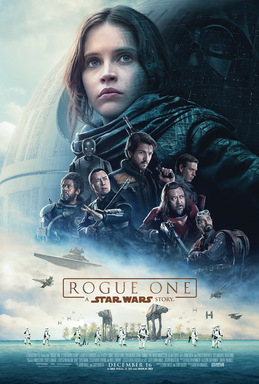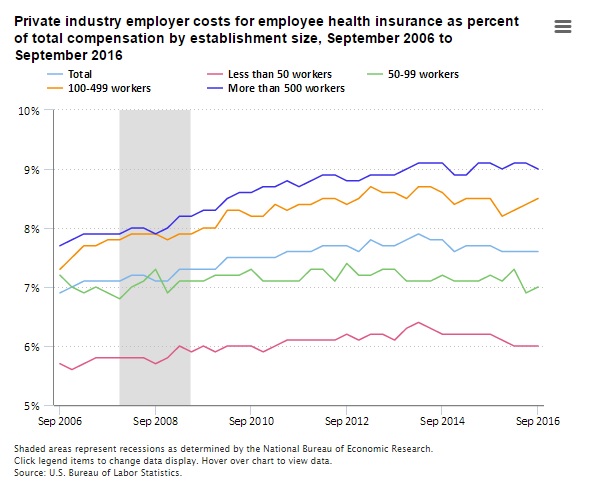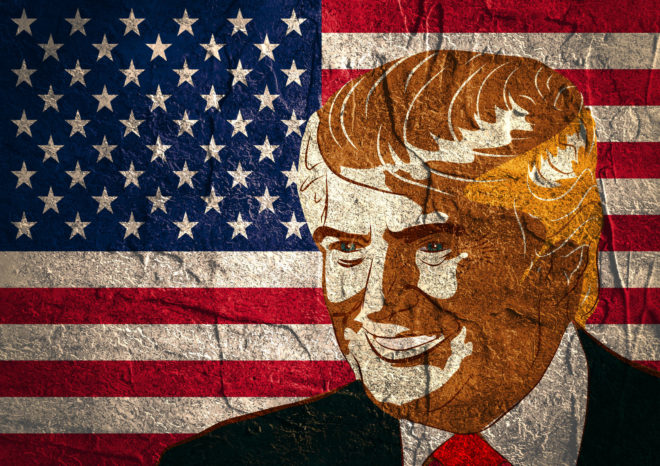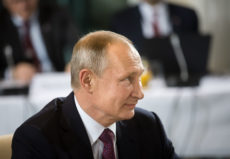 Leaving the movie theater after watching Rogue One: A Star Wars Story, I was wondering if the “one off”—a story that is within the Star Wars universe but is independent from the nine core films (Episodes I through IX)—might really be the recipe needed to reboot the franchise. The move to Disney Studios likely helped reinvigorate the movies (if not the story itself), and Rogue One, unlike the other episodes in the grander saga, embodies the feel and tightness of a complete movie. Solid performances by the cast, a storyline that keeps a brisk pace, and directing that maintains consistent forward momentum have produced a film that is an enjoyable and rousing action yarn. This is no small feat given that the vast majority of the audience knows, or at least suspects, the ending.
Leaving the movie theater after watching Rogue One: A Star Wars Story, I was wondering if the “one off”—a story that is within the Star Wars universe but is independent from the nine core films (Episodes I through IX)—might really be the recipe needed to reboot the franchise. The move to Disney Studios likely helped reinvigorate the movies (if not the story itself), and Rogue One, unlike the other episodes in the grander saga, embodies the feel and tightness of a complete movie. Solid performances by the cast, a storyline that keeps a brisk pace, and directing that maintains consistent forward momentum have produced a film that is an enjoyable and rousing action yarn. This is no small feat given that the vast majority of the audience knows, or at least suspects, the ending.
Rogue One centers on a missing link between Revenge of the Sith (Episode III), which sees the construction of the planet destroying super weapon Death Star, and A New Hope (Episode IV), which chronicles the rise of Luke Skywalker as the Jedi Knight in training who harnesses the Force to destroy it. In Rogue One, we meet Galen Erso (Mads Mikkelsen), the scientist who reluctantly designs and oversees the construction of the Death Star, and discover how the Rebel Alliance secures the plans to destroy it. The story hinges on Galen’s daughter, Jyn Erso (Felicity Jones), who was hidden from the Galactic Empire, rescued by, and then ultimately abandoned by, rebel leader Saw Gerrera (Forest Whitaker). Jyn is a criminal in route to a work camp when she is “rescued” by the rebels, who want her to find her father. They know about the construction of the Death Star and her father’s role, and they see his daughter as the key to finding him and stopping its construction. Thrown into the mix is Cassian Andor (Diego Luna), a Rebel Alliance intelligence officer, who is secretly ordered to kill Galen Erso when they find him.
The film does an excellent job of taking the audience through a linear sequence of scenes and episodes, reintroducing well-known and little-known characters from the epic in ways that should please die-hards without weighing the film down for those less familiar with the details of the epic. Despite dozens of characters entering, reappearing, and leaving the story, many have clearly defined character arcs that allow audiences to connect with them. This gives the characters heart, if not a deeper spiritual soul. Even supporting players such as stoic, rebel veteran Saw Gerrera and the defecting Imperial pilot Bodhi Rook (Riz Ahmed) find their characters changed in meaningful ways by the events and the heroism elicited from the challenges they face. The more intriguing characters include Chirrut Imwe (Donnie Yen), a blind warrior who believes in the Force, and his friend and mercenary rebel Baze Malbus (Jian Wen). The two characters play off each other well, and they embody the nascent and untapped potential of the rebellion along with the implications of applying a naive and untrained understanding of the Force.
In fact, Rogue One is an artful example of how multiple characters evolve along these different arcs in ways that serve the story and the film, and, ultimately, see their own destiny in working with and respecting others in service to a higher purpose (the defeat of the Galactic Empire). Through its focus on individuals and these relationships, the story plays on the development of individuals, their relationships, and the bonding that comes from understanding and evolving mutual respect. This is one of the few movies in the Star Wars saga where I left the theater with a slight sadness about not seeing these characters again. The tightness of the story, pace, and character development benefited from the discipline needed to constrain the story to a normal length feature film (about two hours), and the experience is richer for it.
What is missing from Rogue One, in my view, is a new understanding or exploration into the soul of the saga. Perhaps the movie doesn’t need one to be good, or even excellent. We already know that this is a story of a heroes versus villains, Jedi Knights versus an authoritarian empire, individual courage against collective repression. These stories play out on a grand scale in the original nine episodes of Star Wars. (For libertarian takes on these themes, see articles by software developer Russell Hassan, Ilya Somin’s podcast here, and here, among just a few.) This soul, however, is what captures the imaginations of many in the libertarian movement as well as triggers numerous debates over its content. A new look at how this soul manifests itself in the Rebellion would have deepened the film. Ironically, Rogue One could have provided this through the evolution of the relatively minor characters of Chirrut Imwe and Baze Malbus as well as Saw Gerrara’s decision to break from the Alliance.
My own views probably map closely with those of Amy Sturgis (see her excellent essay in Reason magazine here), who has discussed ways the sprawling Star Wars universe has facilitated broad, cultural myth building around an anti-authoritarian ethic, despite the creator’s ambivalence toward capitalism or a truly libertarian understanding of freedom. George Lucas may be a skeptic, but his story focuses on how individuals work together to fight totalitarianism. The emphasis on individual identity in service to a larger public good gives some libertarians pause, but the central thrust of the story in still focused on protecting individual freedom. Rogue One adds to this by highlighting and honoring the courage and sacrifices of individuals with smaller parts in the overall universe, but whose actions have profound implications for the outcome.
“In the end, Star Wars doesn’t say anything profoundly new, or even say it in a stunningly original way,” writes Sturgis on the saga in general.
“It is a saga with global underpinnings, one that echoes the classical epics that first gave shape to what mythologist Joseph Campbell dubbed the Hero’s Journey. But the true genius of Star Wars rests in how it distills recent popular culture down to its most potent symbols, such as the cowboy or the samurai or Flash Gordon himself. Furthermore, it’s a “working myth” that carries a sense of history and message of substance with which to challenge contemporary audiences. What we’ve seen thus far during the Disney era of the franchise suggests that the most interesting days of Star Wars storytelling are far from over.”
I agree, but would add that in the hands of good filmmakers it makes an excellent and satisfying ride. Rogue One hopefully foretells many more similarly engaging and entertaining films to come from Disney studios.
 In one of my recent blog posts, I discussed the work of NYU economist William Easterly. In particular, I noted how his work on the pitfalls of modern economic development planning bear a striking resemblance to the work and ideas of F. A. Hayek and James M. Buchanan.
In one of my recent blog posts, I discussed the work of NYU economist William Easterly. In particular, I noted how his work on the pitfalls of modern economic development planning bear a striking resemblance to the work and ideas of F. A. Hayek and James M. Buchanan. Peace on earth, goodwill
Peace on earth, goodwill Leaving the movie theater after watching
Leaving the movie theater after watching  The
The 

 President Obama signed the 21st Century Cures Act on December 13. Promoted as a pro-innovation bill, the new law will improve the Food and Drug Administration’s regulatory processes; as well as fund Vice-President Biden’s Cancer Moonshot, the National Institutes of Health, and steps to reduce the opioid epidemic.
President Obama signed the 21st Century Cures Act on December 13. Promoted as a pro-innovation bill, the new law will improve the Food and Drug Administration’s regulatory processes; as well as fund Vice-President Biden’s Cancer Moonshot, the National Institutes of Health, and steps to reduce the opioid epidemic. Last Wednesday, the Trump transition team disclosed the
Last Wednesday, the Trump transition team disclosed the  The FBI and CIA are in agreement that Russia in some way interfered in the U.S. election. What
The FBI and CIA are in agreement that Russia in some way interfered in the U.S. election. What  Last week, Dutch politician
Last week, Dutch politician 




